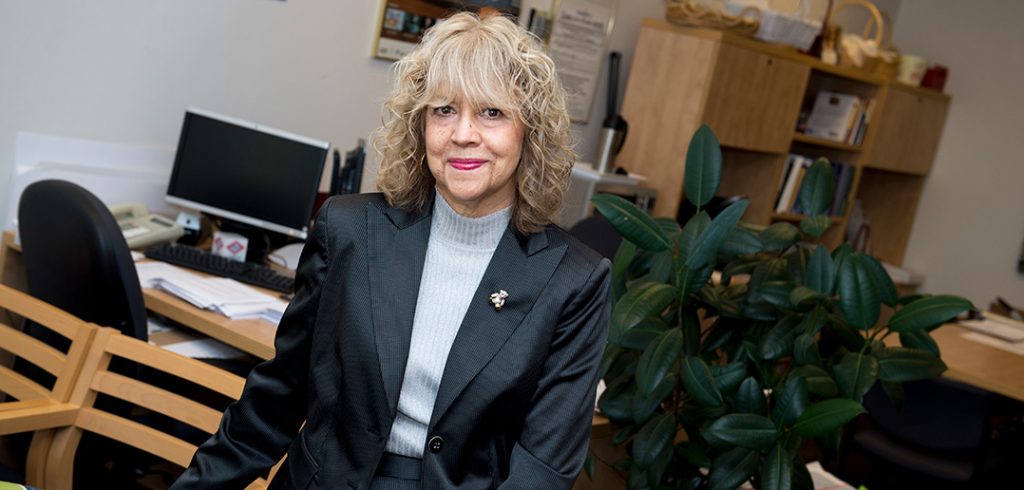In schools throughout New York City, Fordham is known as a fount of knowledge, a valuable resource and a trusted partner. For this, the Graduate School of Education’s (GSE) Anita Vazquez Batisti, Ph.D., GSE ’78, is due much credit.
Batisti, associate dean and executive director at the Center for Educational Partnerships, has been spearheading coordination between the GSE and the New York City schools since 2006, when she was tapped by Dean Emeritus James Hennessy to create a center that would be a bridge between academia and working teachers.
For her efforts, Batisti was awarded this past academic year with the Fordham President’s Meritorious Service award. Bronx Borough President Ruben Diaz Jr. issued a proclamation recognizing her work, and also declared Nov. 16 to be “The Center of Educational Partnerships Day.”
Although the New York City educational landscape has changed much in the past 10 years, Batisti said the center’s core goal—to deliver applied research to schools—has never wavered. The center does this by training teachers in literacy, math and science, and social studies; supervising a regional bilingual education resource network; and helping implement educational reforms.
That last charge of educational reform has been very important, she said, as New York City schools experienced a shift when Bill de Blasio succeeded Michael Bloomberg as mayor, and Carmen Farina took over for Dennis Walcott as chancellor. Under Bloomberg, school principals were encouraged to identify with CEOs and contract to help schools secure individual services, many of which Batisti’s center offered. Under the current system, that Partnership Support Organization model has been replaced by more comprehensive partnerships with low performing schools, focusing on the whole child. The center is currently partnered with three schools in the Bronx.
“The mandate that Dean Emeritus Hennessy gave me was, create a center to go into schools and do more than what we’re doing now,” she said. “We wanted GSE much more involved at all levels of school life in schools throughout the city and throughout the metropolitan area. I think we’ve done that with the initiatives we’ve implemented, and the services we’ve provided.”
The center has brokered agreements with groups like Mentoring in Medicine at Montefiore Hospital, which sends pre-med students into Fordham community schools to conduct science workshops, and Footprintz, which recruits former college basketball players to teach basketball at the schools. Footprintz has been successful in boosting attendance at schools by scheduling “zero period” sessions at 7:30 a.m., before school officially opens.
“I never thought I’d be negotiating a memorandum of understanding with an almost-NBA player. We’ve really broadened our circle, and that’s been quite an undertaking with the community concept, because the focus is on the whole child, which includes mental health,” she said.
“I’m very proud of who we’ve brought into the schools because we all worked as a team, and our goal is the same.”
Closing the gap between schools that are resource rich and those that are not is a big priority for the center. For the last three years, Batisti has recruited Fordham undergraduates to tutor elementary, middle, and high students in STEM subjects on Saturday mornings. The center also alerts schools when opportunities arise; for example, when New York Botanical Garden is giving away 150 tickets to its annual holiday train show. When the center was partnered with schools under the Bloomberg administration, it was instrumental in helping its network of all 35 schools procure white boards, as well as obtain several grants.
The intense focus on nitty-gritty, on-the-ground details is key, as is the ability to obtain outside funding, Batisti said. Over the past 10 years, the center has raised over $91 million in both grants and earned income.
Batisti, a native New Yorker who still at the elementary school she attended (PS 183 on Manhattan’s Upper East Side), would like to expand the center’s efforts nationally and internationally. In July, she will travel to Soria, Spain for the III International Colloquium on Languages, Cultures, Identity in School and Society. There, she and Center for Educational Partnership Assistant Director Nancy Rosario Rodriguez will present “Developing Leadership for the Changing Demographics: The Multicultural Education Teacher Leadership Academy Model (METLA).”
As schools in the United States and Europe cope with increases in student populations that have different language needs, and different socioeconomic statuses, Batisti said that working in New York City has taught the center’s staff how to thrive in a fast-paced environment where resources are scarce.
“It’s not impossible but it’s become even more challenging, and you have to keep thinking differently,” she said. “You can’t just keep doing the same thing if it doesn’t work.”

